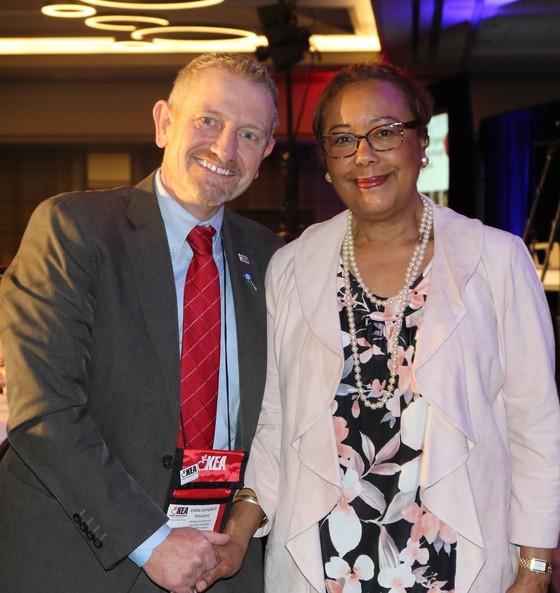 Sharon Porter Robinson has spent almost five decades working in and for education and a lifetime doing civil rights work. On April 7, she was recognized for her efforts with the 2022 Lucy Harth Smith-Atwood S. Wilson Award for Civil and Human Rights in Education at the 50th Kentucky Education Association (KEA) Delegate Assembly.
Sharon Porter Robinson has spent almost five decades working in and for education and a lifetime doing civil rights work. On April 7, she was recognized for her efforts with the 2022 Lucy Harth Smith-Atwood S. Wilson Award for Civil and Human Rights in Education at the 50th Kentucky Education Association (KEA) Delegate Assembly.
“I come here today accepting this award in all humility and with a sense of urgency, that I guess has never left me … since the early days,” said Robinson. “It was a journey of learning that was driven by a sense of urgency to make matters right.”
The Smith-Wilson Award is given annually to a person or organization that has made notable contributions in any of the following areas: encouraging and supporting minorities to enter the teaching profession; advancing opportunities, especially educational opportunities, for youth of color; initiating or continuing impactful work in the areas of human and civil rights; or leading in the field of innovative, creative and equitable education for all students.
Robinson, who serves as vice chair of the Kentucky Board of Education (KBE), began her career in education as a classroom teacher in Fayette County and continued in private educational research and advocacy organizations. She most recently served as president and chief executive officer of the American Association of Colleges for Teacher Education from 2005 to 2017, becoming the first Black woman to head the Washington-based nonprofit that represents more than 800 postsecondary institutions with educator preparation programs.
“I met Sharon when I was a first-year teacher and she was a leader in our local association,” said Mary Ann Blankenship, who nominated Robinson for the award. “I was in awe of her then and remain so to this day. Her courage, conviction, advocacy and grace working for the rights of educators and their students has set an example for me and countless others throughout her exemplary life and career.”
Robinson learned the value of advancing opportunities for youth of color from her parents, both deeply involved in education. Her father, Woodford R. Porter Sr., chaired the Louisville Board of Education, and her mother, Harriett Bibb Porter, was a teacher.
“As a teacher herself, Sharon made sure her own students of color had opportunities and the support to advance,” said Blankenship.
During her 14 years heading the National Education Association’s (NEA’s) Center for Innovation and later working in the U.S. Department of Education, Robinson kept in the forefront the need to provide students of color with both the opportunities and support they deserved. As the vice chair of KBE, Blankenship said Robinson “works tirelessly” to provide opportunities for youth of color.
“In most of the leadership positions she has held, she has been the first African-American woman to serve in that position, providing an example of achievement for others of all races, genders and ethnicities,” Blankenship said.
Robinson began her education at the now closed Virginia-Avenue Elementary School in Louisville’s West End and graduated from Shawnee High School (now The Academy @ Shawnee) in 1962. She earned bachelor’s degrees in English and psychology, a master’s degree in education and a doctorate in educational administration and supervision from the University of Kentucky (UK). She also completed the Harvard Business School Advanced Management Program.
After she began teaching, she was elected to positions with the Fayette County Education Association and KEA. Later, she taught at a U.S. Air Force base in Bitburg, Germany, worked with the Jefferson County Education Consortium and served as director of the NEA’s National Center for Innovation.
When appointed by President Bill Clinton in 1993, she became the first Black assistant secretary of education with the U.S. Department of Education’s Office of Educational Research and Improvement. She served in that position until 1997. She worked from 1997 to 2004 for the Educational Testing Service, an international research and assessment organization, as president of its Educational Policy Leadership Institute in Princeton, N.J., and as vice president for state and federal relations. While a vice president at Educational Testing Service, she worked to assure equity in teacher licensure tests.
Her achievements in Kentucky and on the national level have led to such honors in her home state as being inducted into the UK College of Education Alumni Hall of Fame in 1991 and the UK Alumni Association Hall of Distinguished Alumni in 2010.
Even while living out of state, Robinson remained interested, active and involved in Kentucky education and civil rights, Blankenship said. It was only natural that after serving in leadership at the national level for decades, she resumed that work in Kentucky when she returned in 2017.
When accepting her award, Robinson stressed the importance of moving students forward and making every school worthy of their best ambitions.
“Cultivate, motivate and inspire even more audacious ambitions on their behalf and on ours,” she said. “Then we will be on the right path to justice and equality and peace.”
Today, Robinson works with Simmons College and Jefferson County Public Schools on minority teacher recruitment and development, a mission she began as a graduate student at UK and later as president of the American Association of Colleges of Teacher Education.
Presented for the first time in 1974, the Smith-Wilson Award is named for Lucy Harth Smith (1888-1955), principal of Lexington’s Booker T. Washington Elementary School for 20 years, and Atwood S. Wilson (1895-1967), principal of Louisville’s Central High School for 29 years.
A pioneer in promoting the study of Black history in the nation’s schools and serving as both state and national president of the Association for the Study of Negro Life and History, Smith also was the president of the Kentucky and National Association of Colored Women. She served on the Governor’s Committee on Youth and Children and on the executive board of the Kentucky Interracial Council.
A longtime trustee of the Louisville Free Public Library, Wilson presented the resolution that abolished segregation of the races in Louisville’s main library. Later all city libraries were desegregated.




Leave A Comment